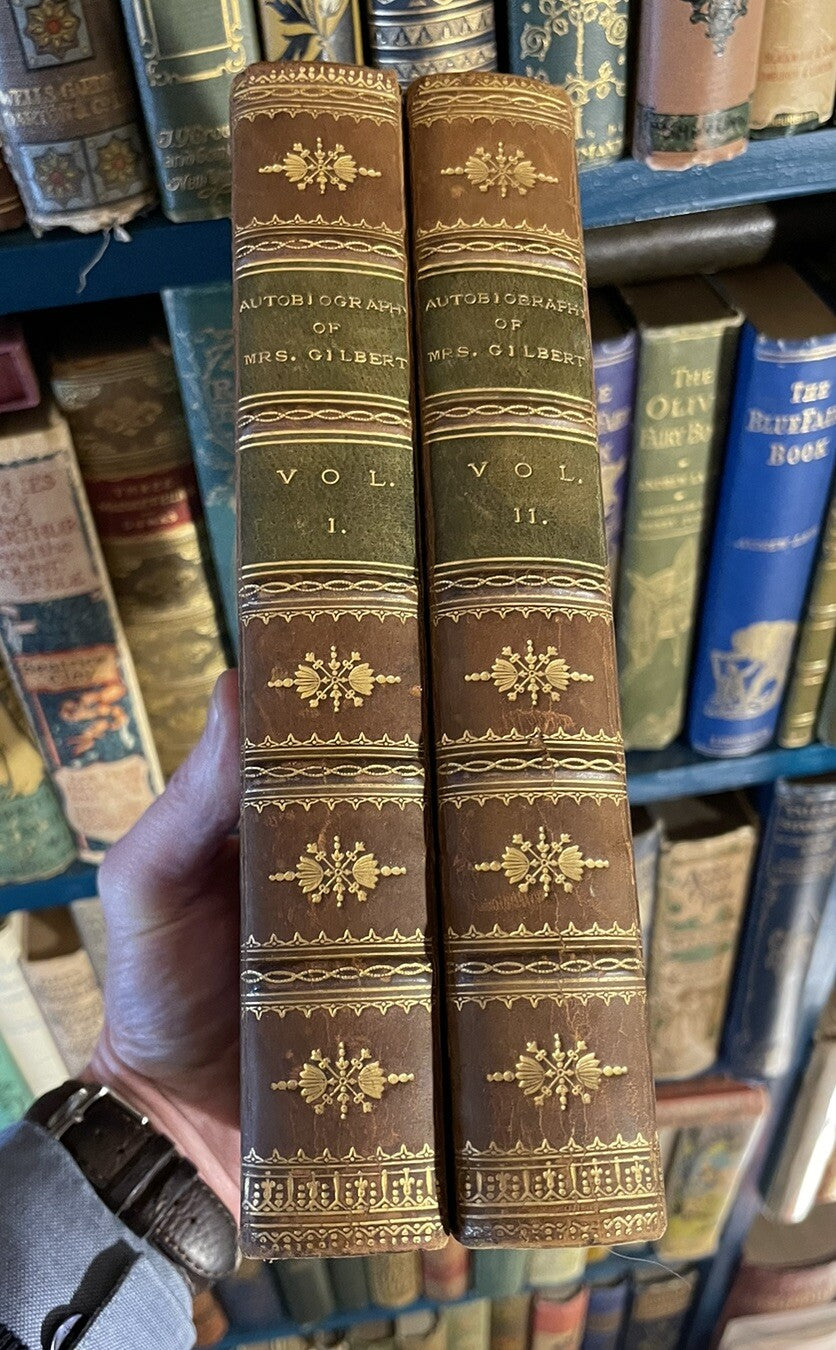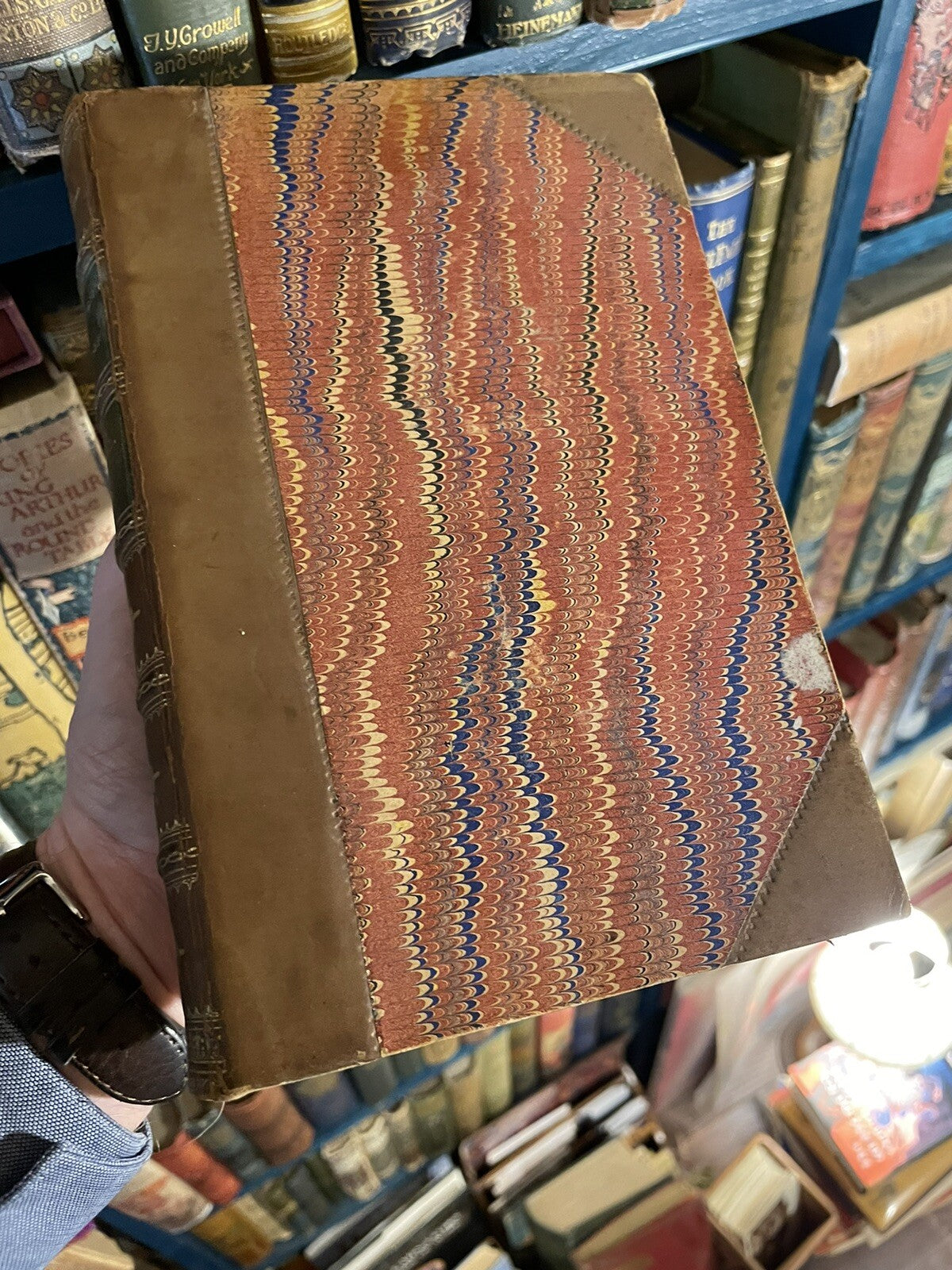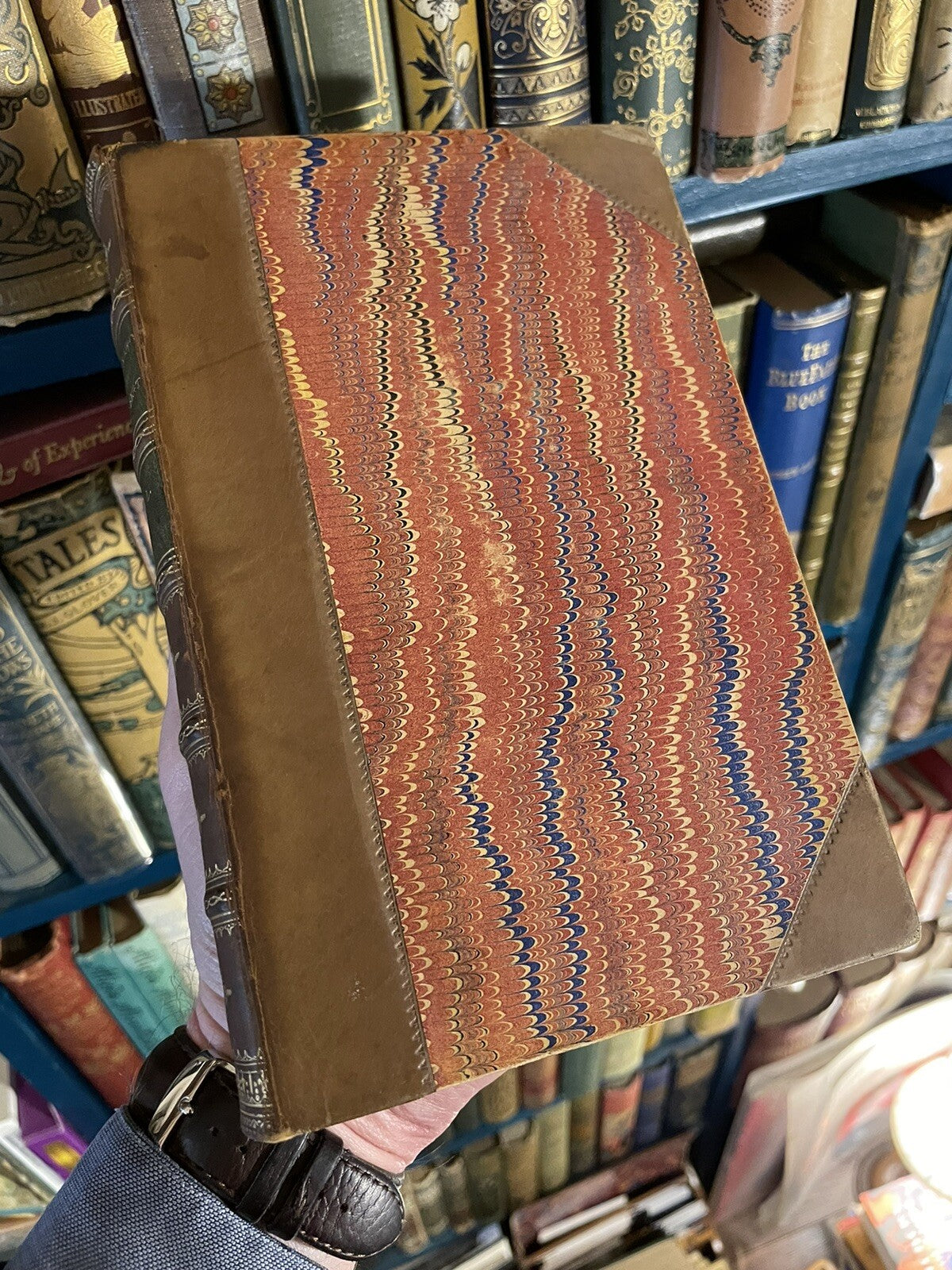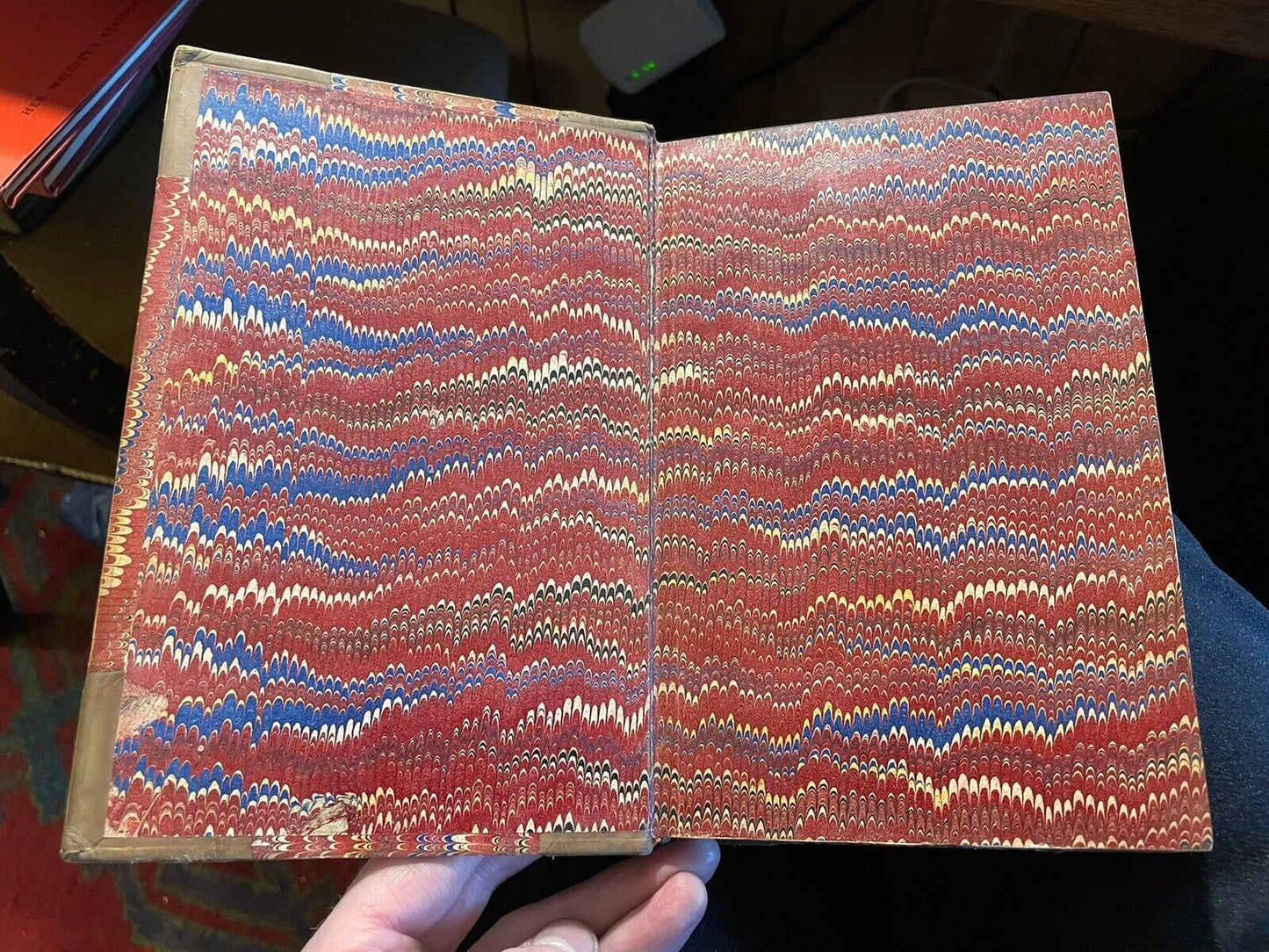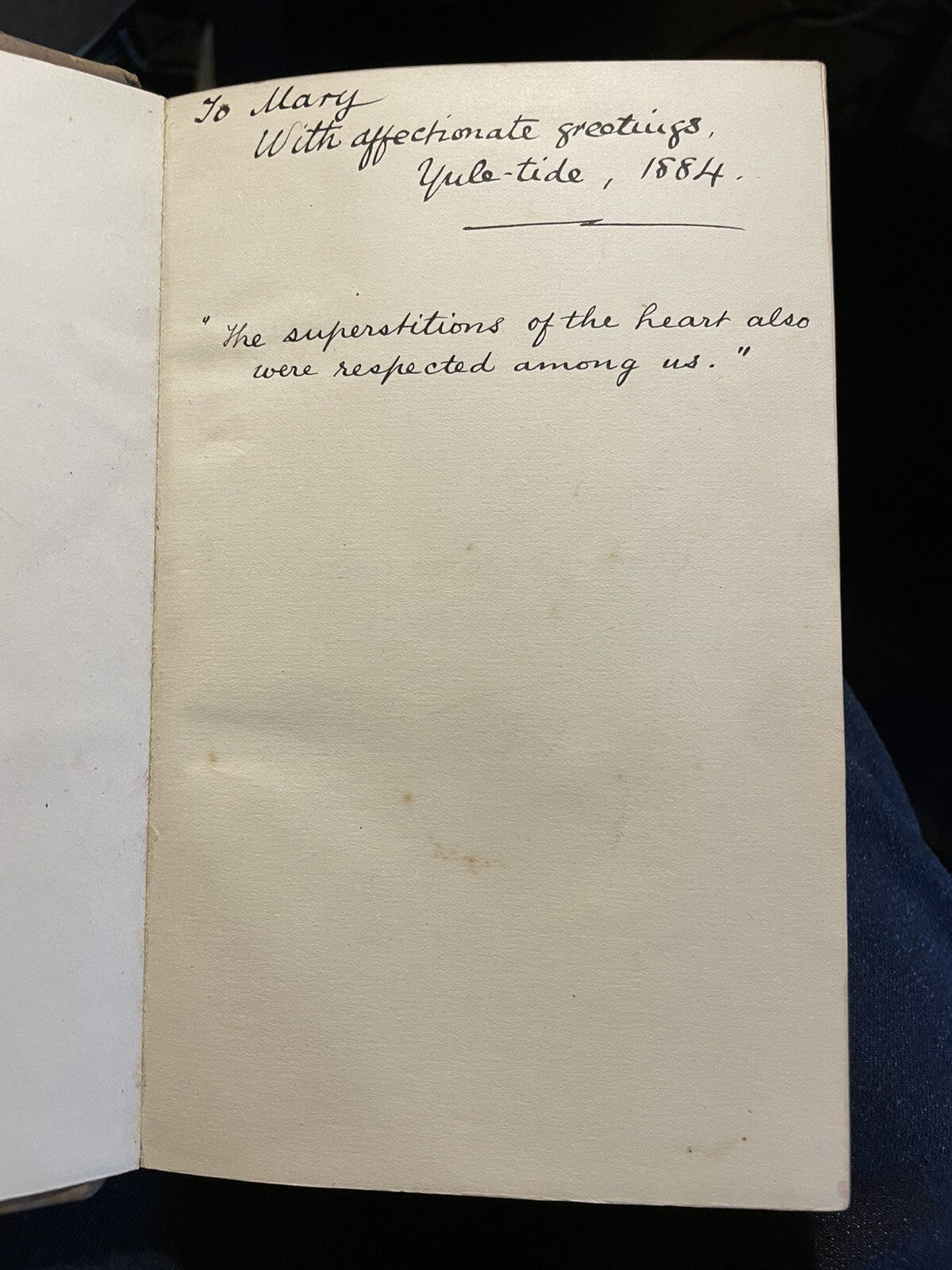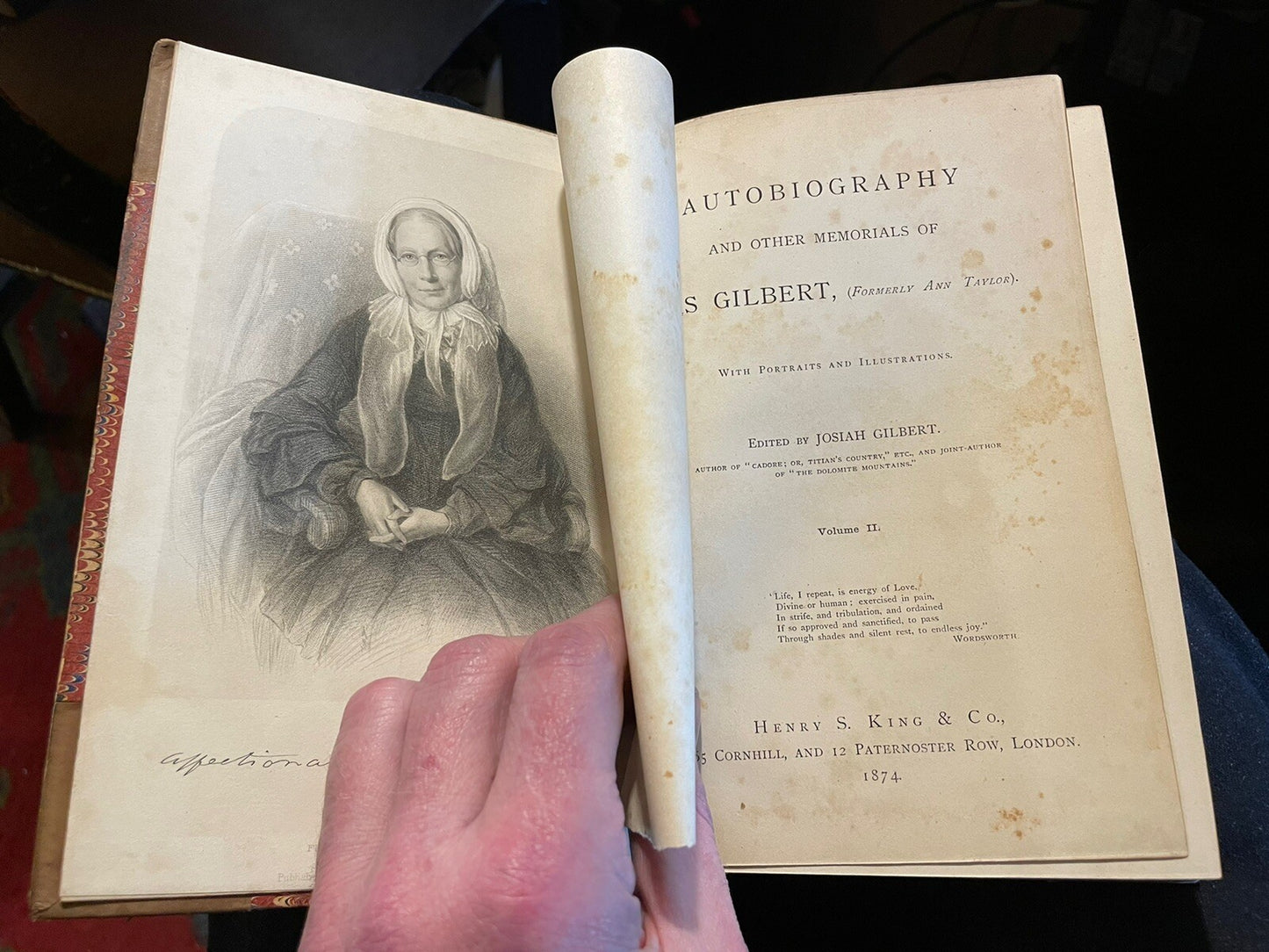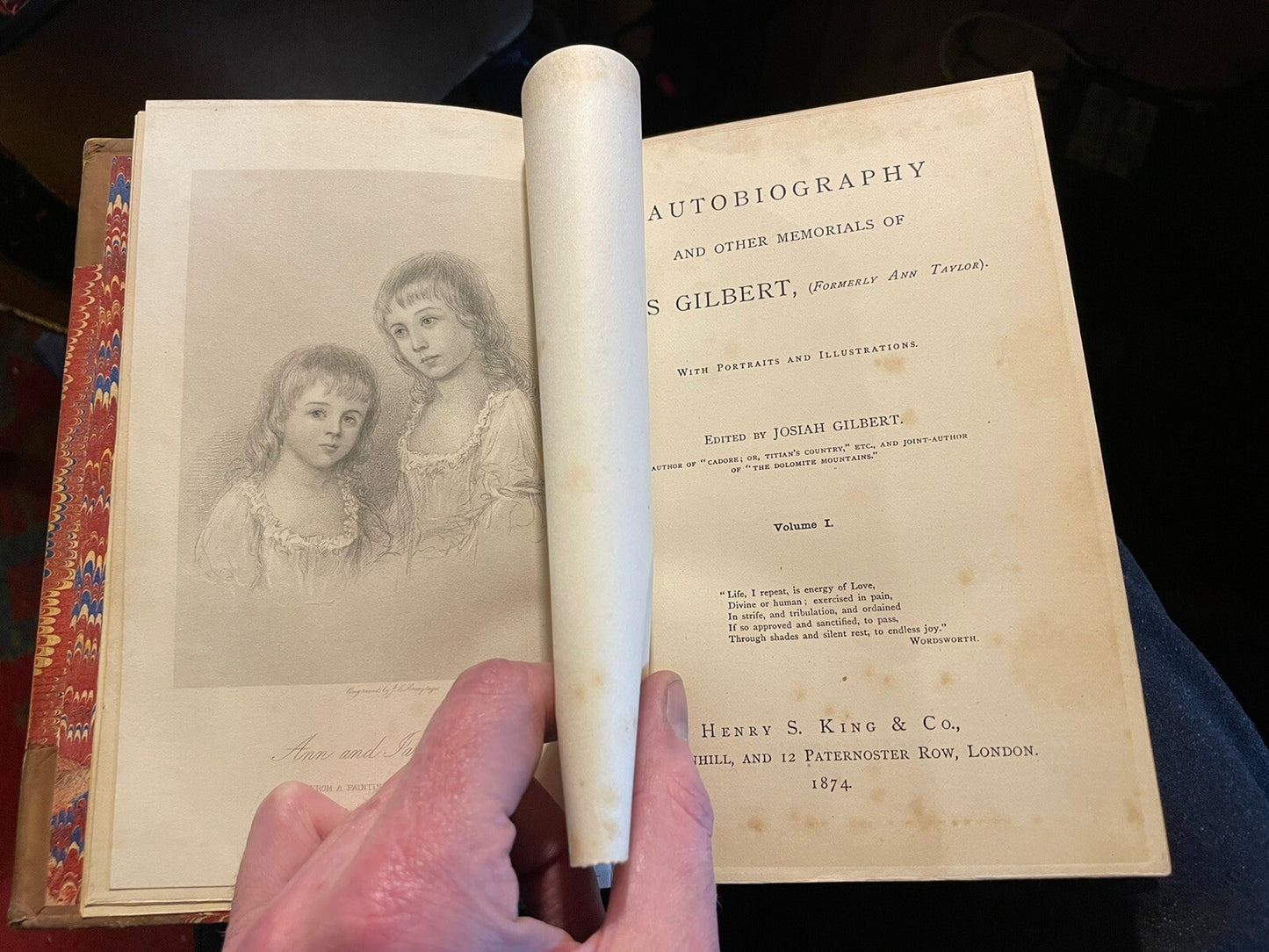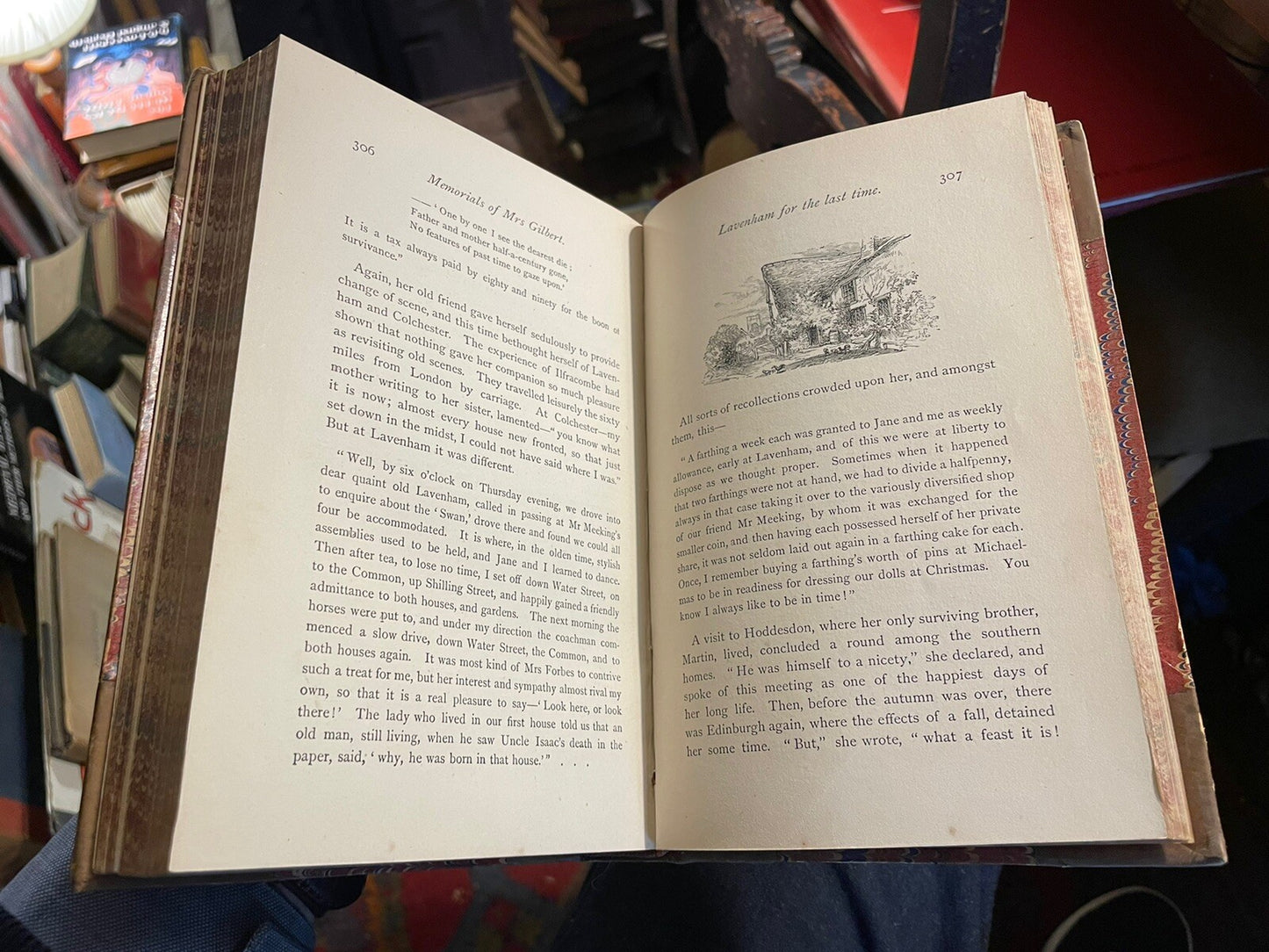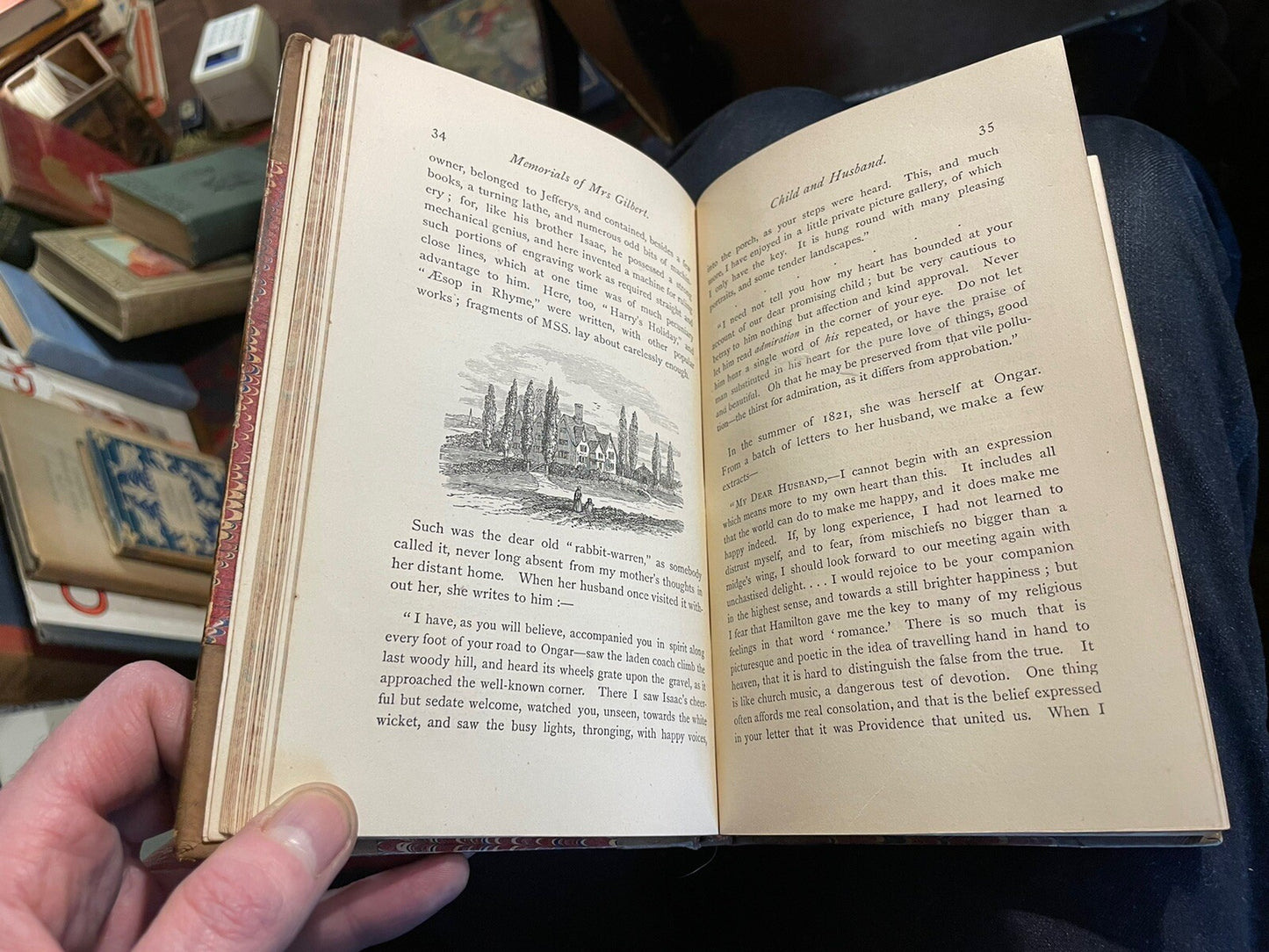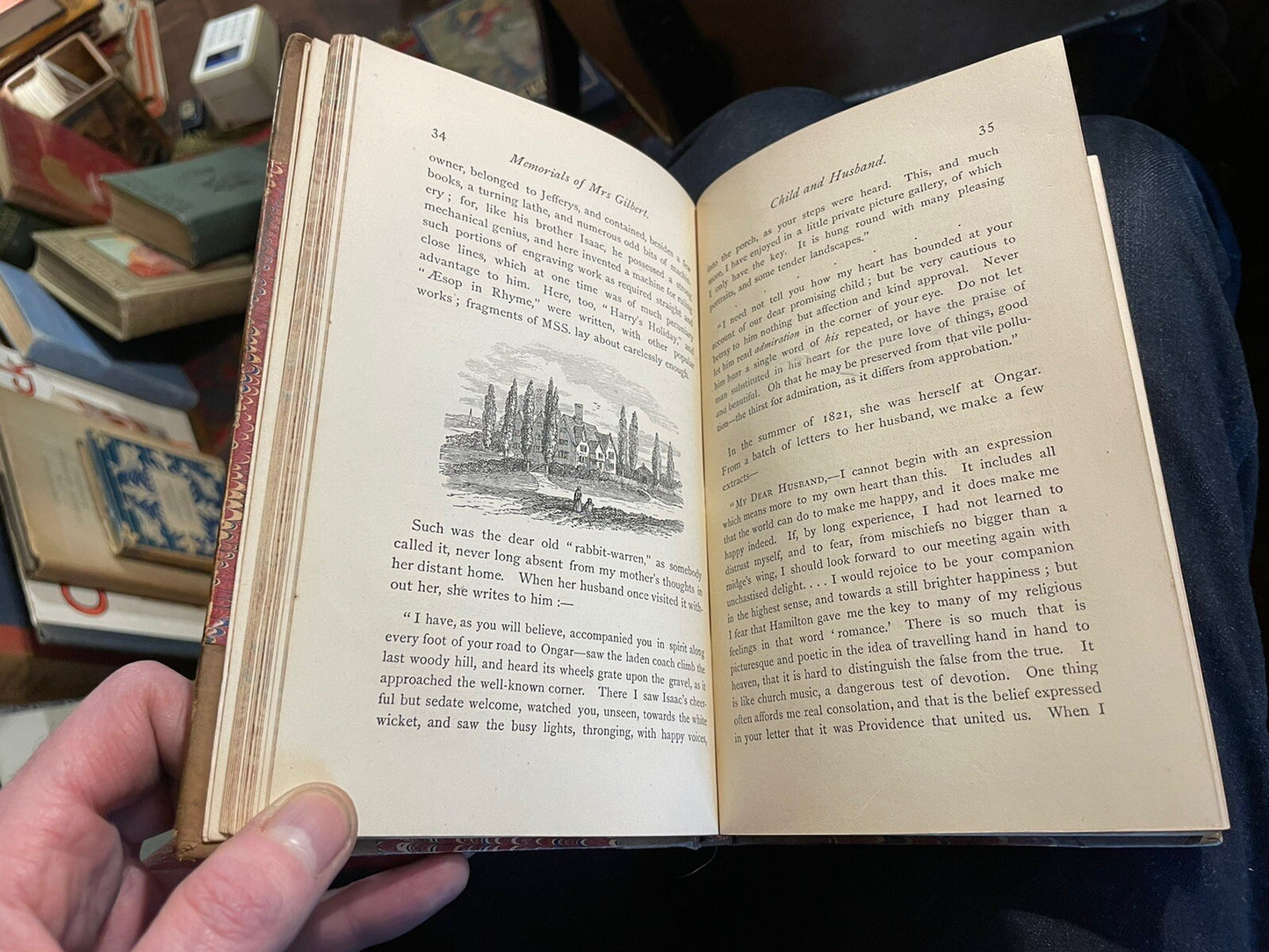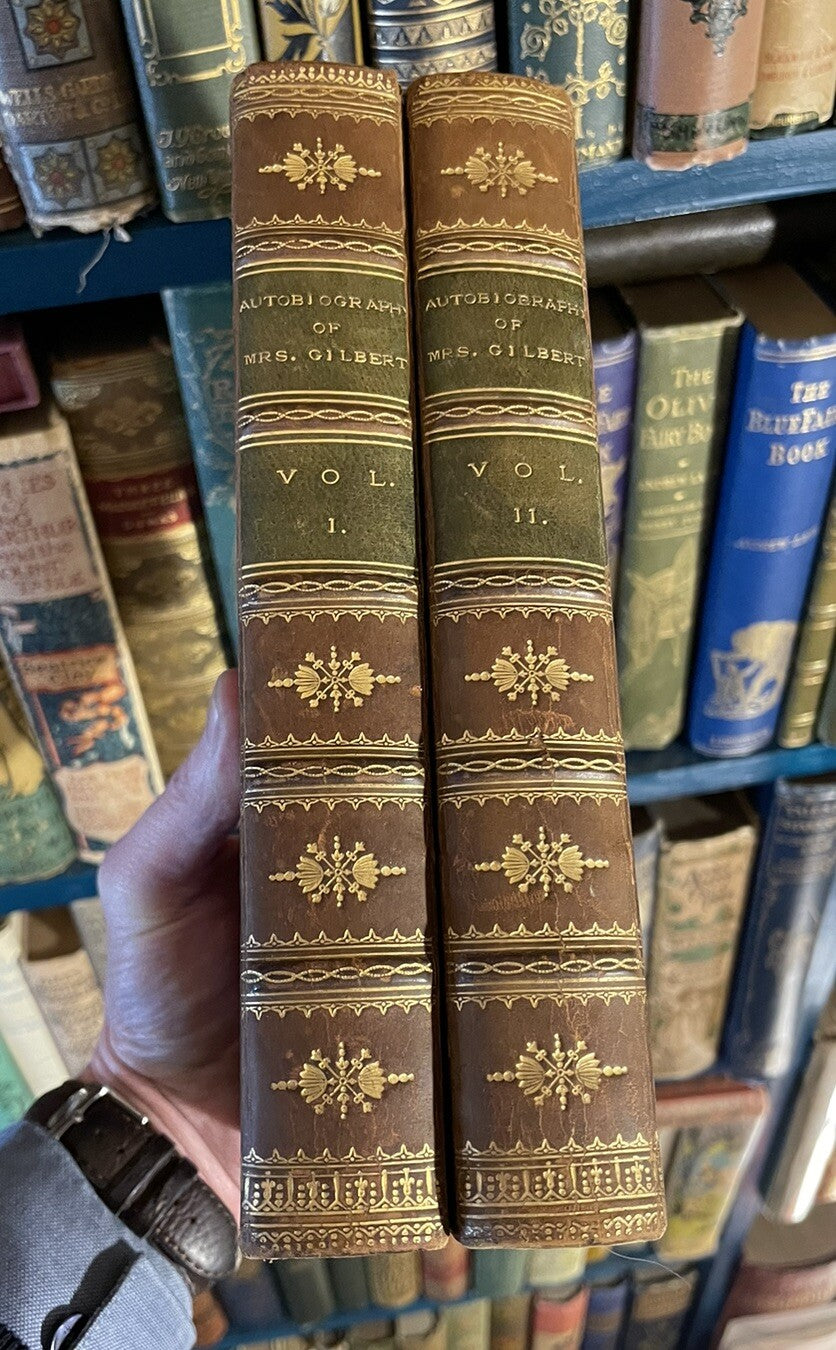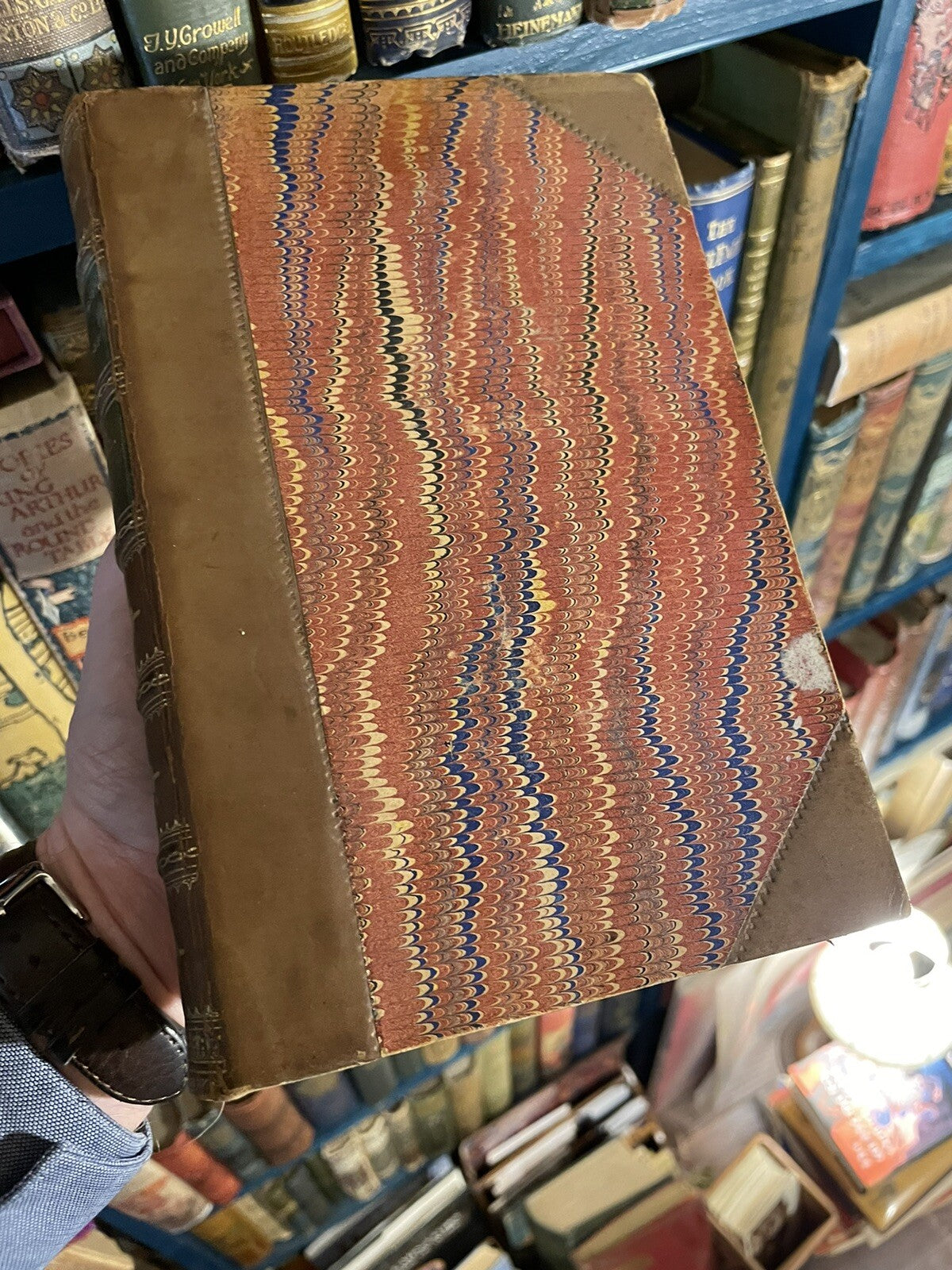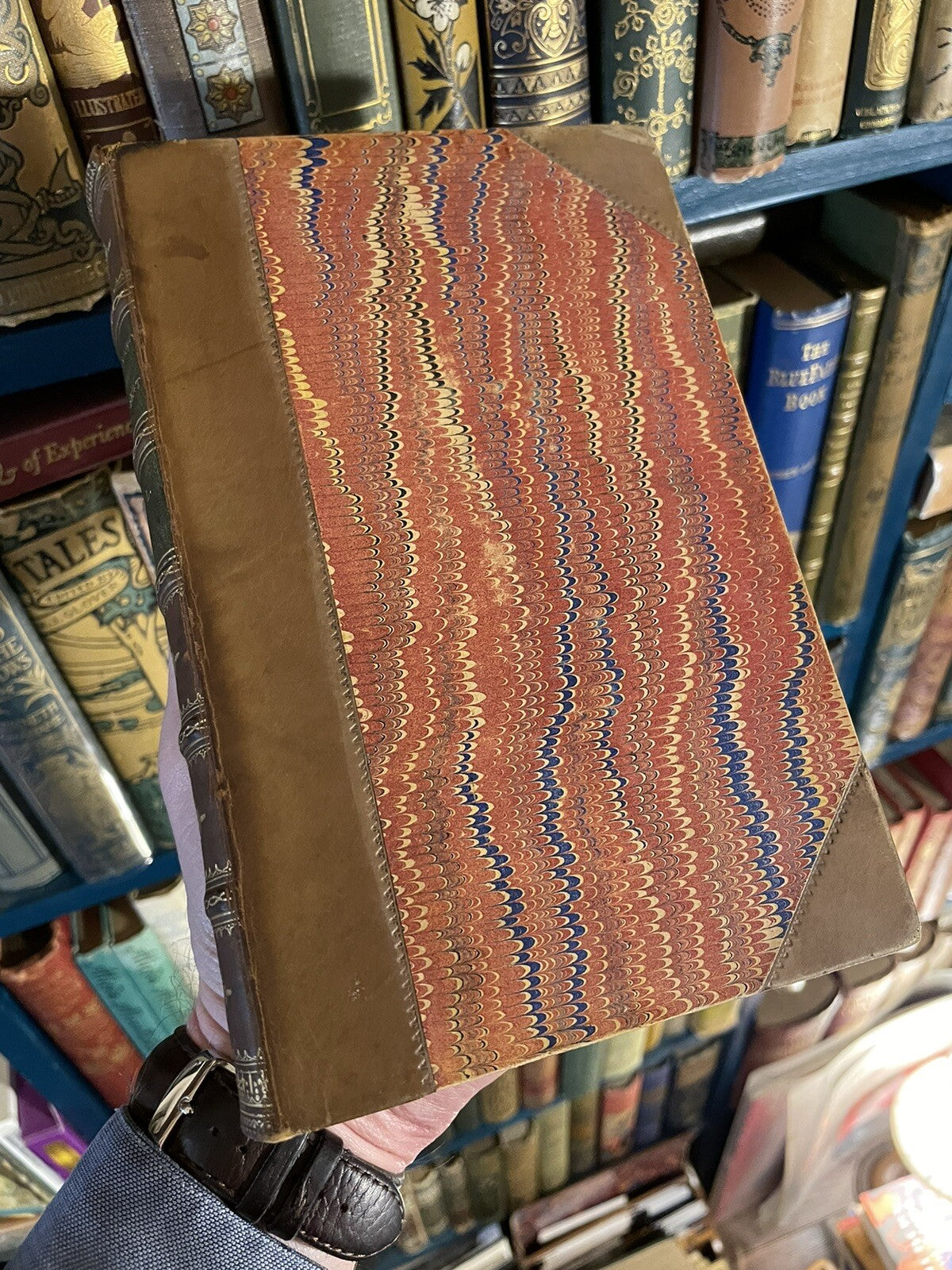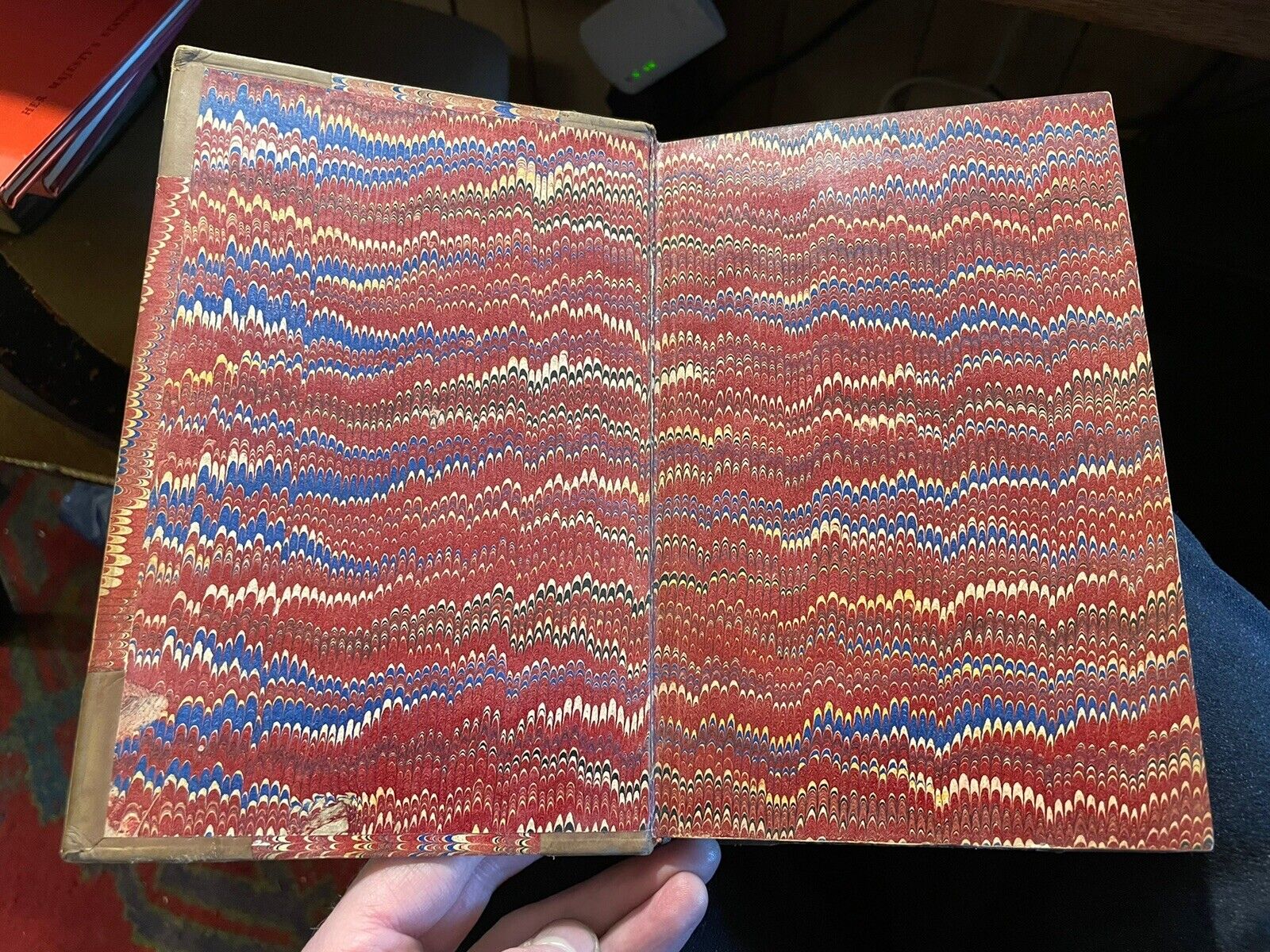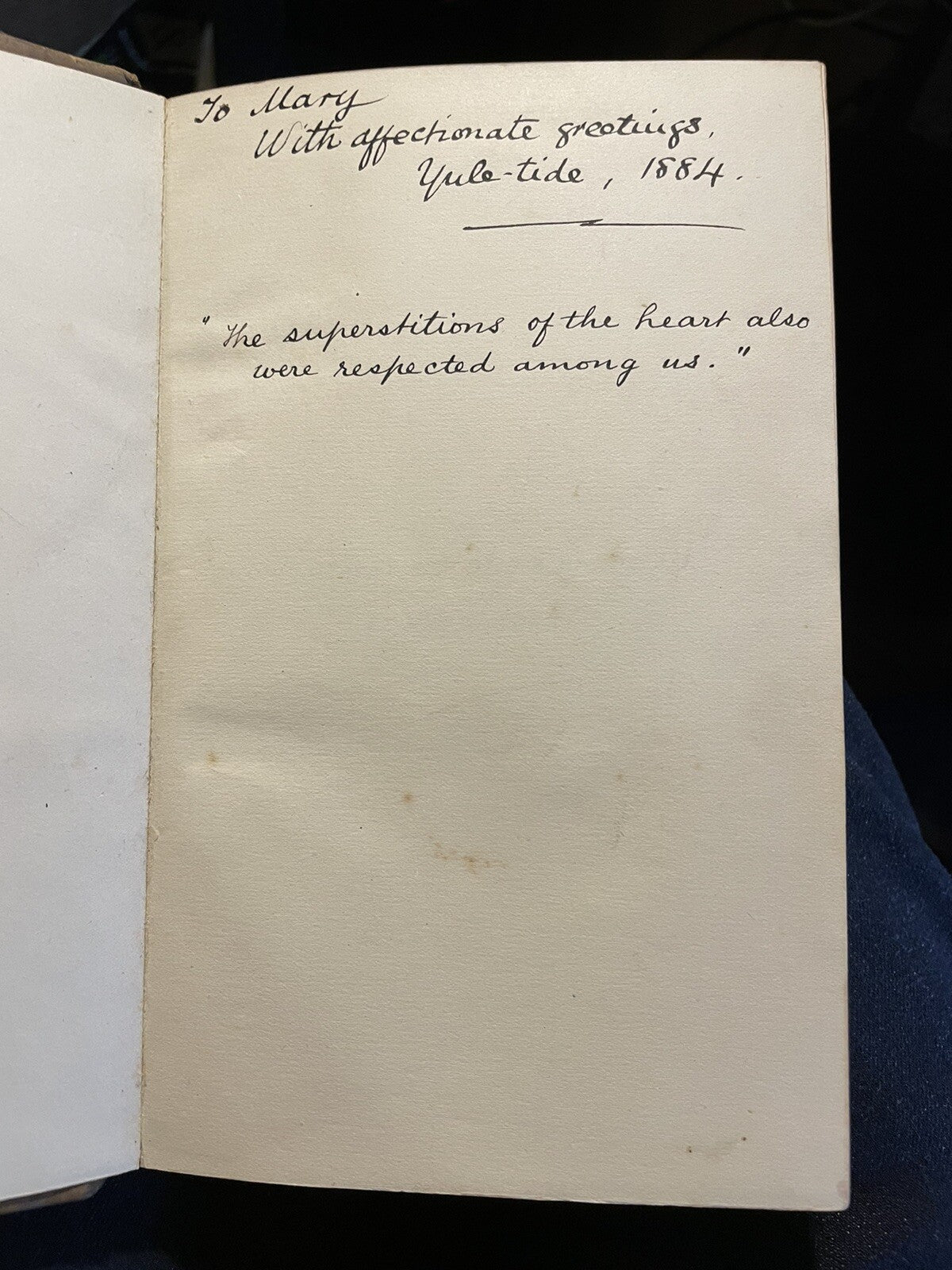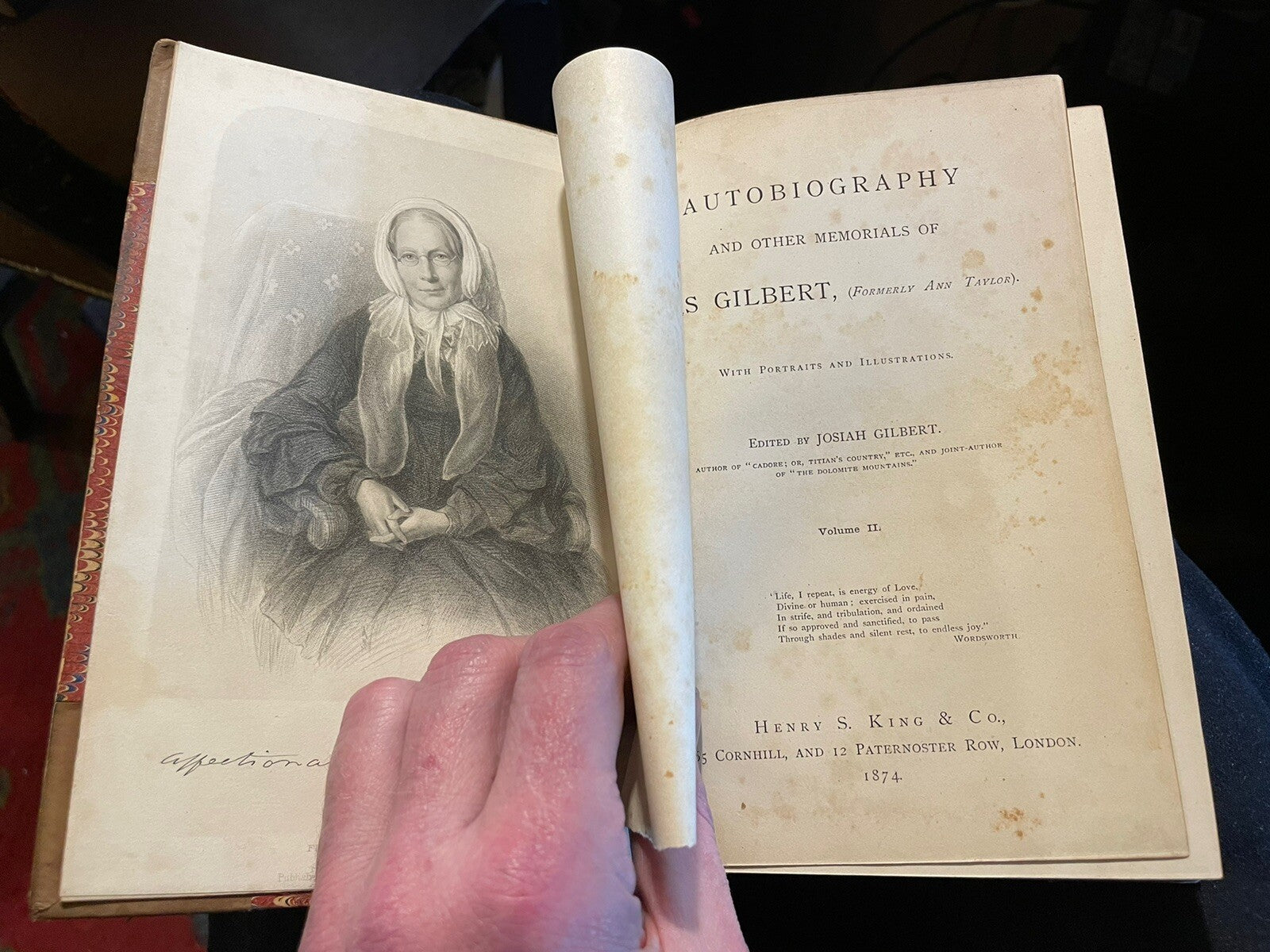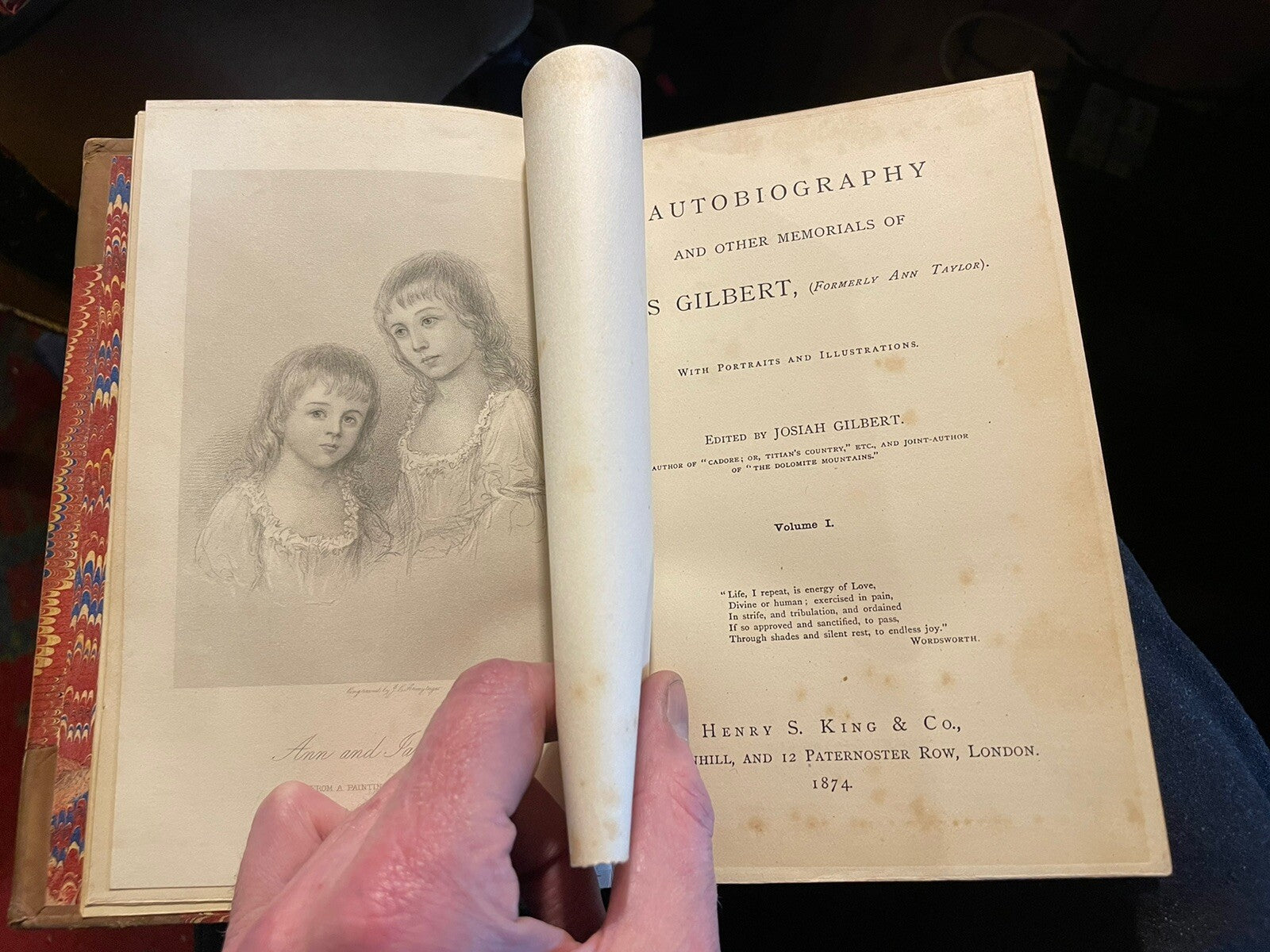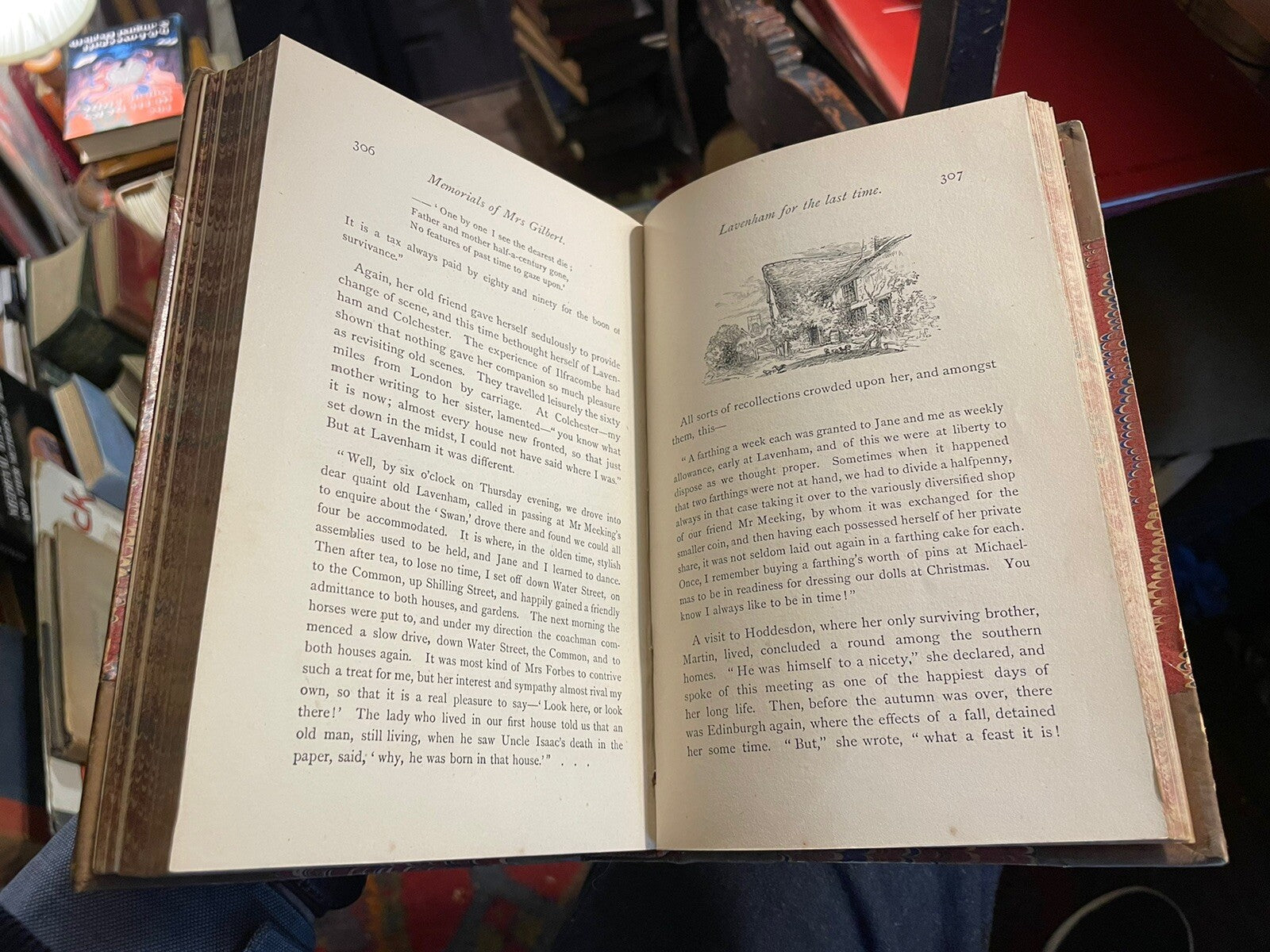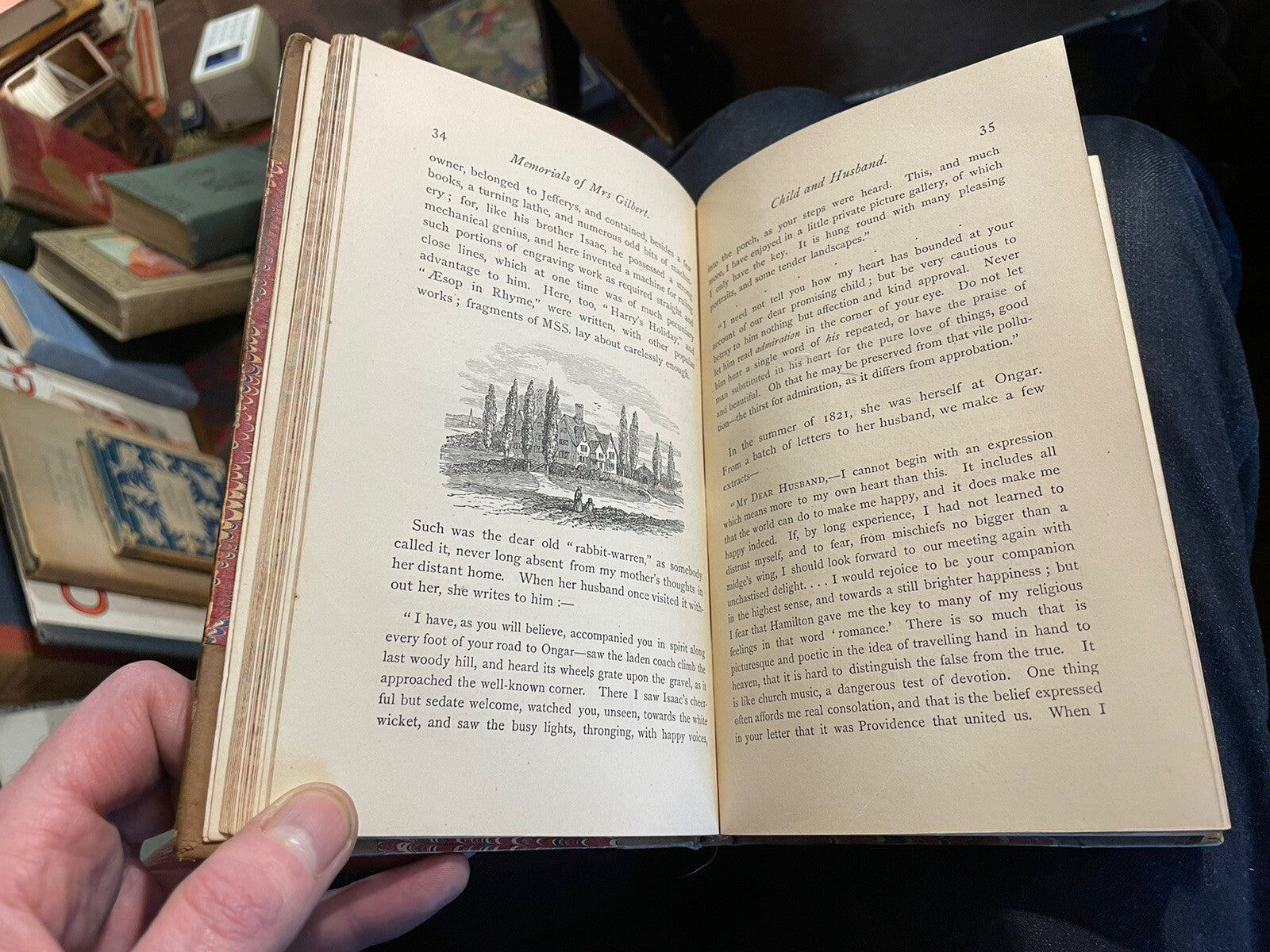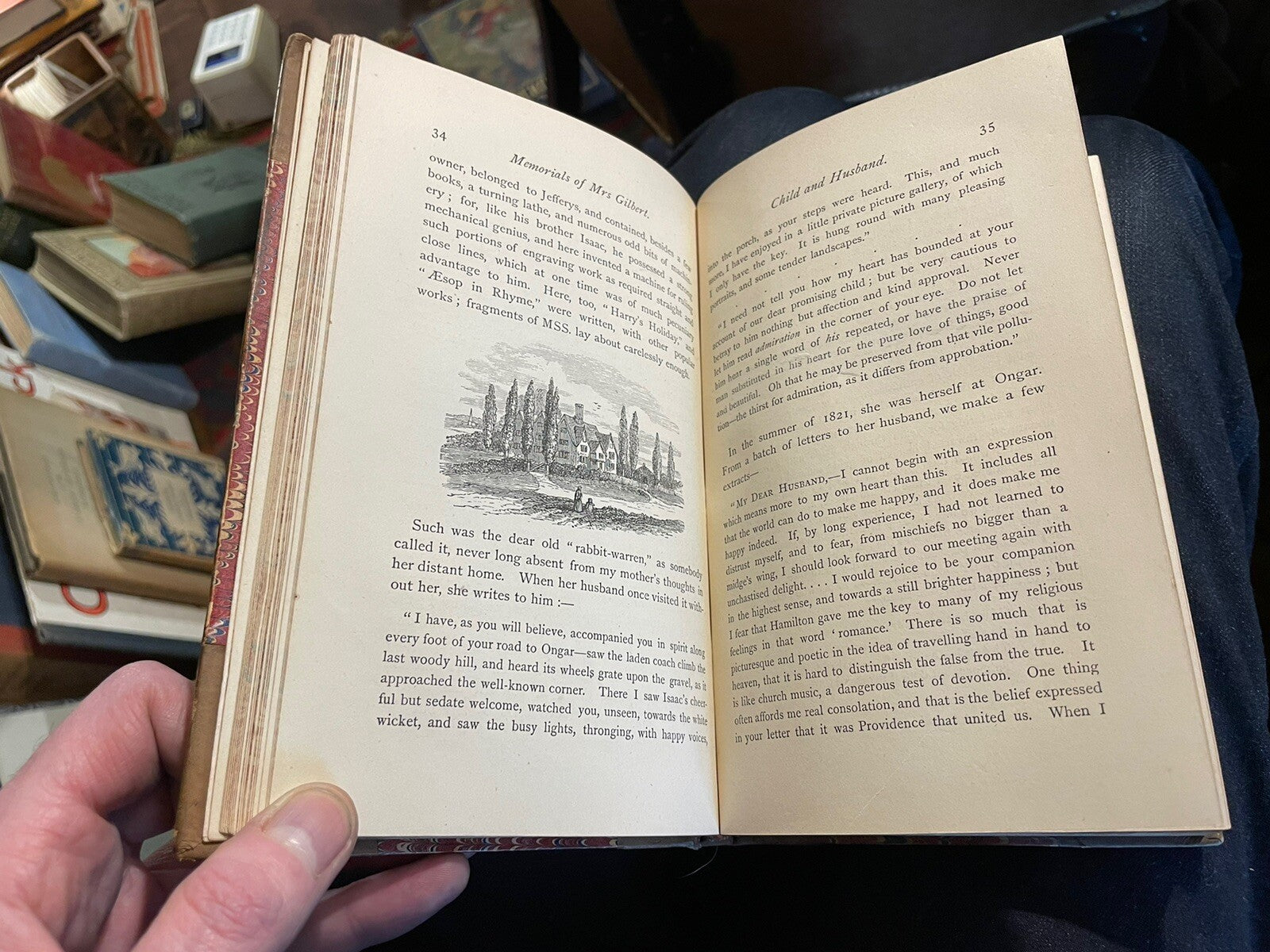The Gently Mad Book Shop
1874 Autobiography and Other Memorials of Mrs Gilbert ( Ann Taylor )
1874 Autobiography and Other Memorials of Mrs Gilbert ( Ann Taylor )
Couldn't load pickup availability
Autobiography and Other Memorials of Mrs Gilbert ( Formerly Ann Taylor )
With Portraits and Illustrations
With Portraits and Illustrations
Edited by Josiah Gilbert
Published by Henry S. King & Co., London, 1874. First Edition. Scarce. Complete in Two Volumes. Half leather bindings, 8vo, marble page edges and marble endpapers, pp xv, [iv], 4-325, vii, [iv] 4-342. Illustrated.
CONDITION
Ann
Gilbert (née Taylor; 30 January 1782 – 20 December 1866) was an English
poet and literary critic. She gained lasting popularity in her youth as a
writer of verse for children. In the years up to her marriage, she
became an astringent literary critic. However, she is best remembered as
the elder sister and collaborator of Jane Taylor.
The Taylor
sisters were part of an extensive literary family, daughters of the
engraver Isaac Taylor of Ongar and the writer Ann Taylor. Ann was born
in Islington and lived with her family at first in London and later in
Lavenham, Suffolk, in Colchester, and briefly in Ongar. The sisters'
father, Isaac Taylor, and her grandfather were both engravers. Her
father later became an educational pioneer and Independent minister,
writing a number of instructional books for the young. Their mother, Mrs
(Ann Martin) Taylor (1757–1830) wrote seven works of moral and
religious advice in many respects liberal for their time, two of them
fictionalized.
Isaac, brother of Ann and Jane, wrote as a
theologian, but also as the inventor of a patent beer tap. Their elder
brother Charles Taylor edited The Literary Panorama, for which he wrote
on topics from art to politics, and produced anonymously a massive
annotated translation of Augustin Calmet's Dictionary of the Bible.
Their youngest brother Josiah was a publisher, chiefly of works on
architecture and design.
The sisters and their authorship of
various works have often been confused, usually to Jane's advantage.
This is in part because their early works for children were published
together and without attribution, but also because Jane, by dying young
at the height of her powers, unwittingly attracted early posthumous
eulogies, including what is almost a hagiography by her brother Isaac,
and much of Ann's work came to be ascribed to Jane, a borrowing which,
Ann ruefully remarked, she could ill afford and which Jane certainly did
not require. It is true that Jane achieved much more than Ann as a
writer of poetry for an adult readership – though Ann's poem "The
Maniac's Song", published in the Associate Minstrels (1810), was
probably the finest short poem by either sister, and it has been
postulated as an inspiration for Keats's La Belle Dame sans Merci
(Lynette Felber: Ann Taylor's "The Maniac's Song": an unacknowledged
source for Keats's "La Belle Dame sans Merci".
However, Ann
Taylor also deserves remembering as a writer of prose, particularly for
her autobiography and the many letters of hers that survive. Her style
is strong and vivid, and when she was not too preoccupied with moral and
religious themes, she tended, like her sister Jane, to pessimism about
her own spiritual worth – it is often shot through with a pleasing and
sometimes acerbic wit. The autobiography also provides detailed
information on the life of what was a moderately prosperous dissenting
family in the late 18th and early 19th centuries.
Both poems
attracted the compliment of frequent parody throughout the 19th century.
The logician Augustus De Morgan asserted (somewhat extravagantly) that
Gilbert's mother wrote "one of the most beautiful lyrics in the English
language, or any other language" and not knowing that Ann Gilbert was
still alive, called upon Tennyson to supply a less heterodox version of
the final stanza, which seemed to de Morgan unworthy of the rest.
Twinkle,
Twinkle, Little Star" is an English lullaby. The lyrics are from an
early-19th-century English poem written by Jane Taylor, "The Star". The
poem, which is in couplet form, was first published in 1806 in Rhymes
for the Nursery, a collection of poems by Taylor and her sister Ann.
(Loc : Desk, Top shelf, middle)
A good first edition. The leather bindings are good and the hinges are secure with no cracking, marble endpapers are very good, some light foxing to title pages and to the tissue guards that protect the frontispiece, all text clean throughout and free from foxing, stains etc, neat inscription to the front endpaper of volume I only. Overall very good.
Ann Gilbert (née Taylor; 30 January 1782 – 20 December 1866) was an English poet and literary critic. She gained lasting popularity in her youth as a writer of verse for children. In the years up to her marriage, she became an astringent literary critic. However, she is best remembered as the elder sister and collaborator of Jane Taylor.
The Taylor sisters were part of an extensive literary family, daughters of the engraver Isaac Taylor of Ongar and the writer Ann Taylor. Ann was born in Islington and lived with her family at first in London and later in Lavenham, Suffolk, in Colchester, and briefly in Ongar. The sisters' father, Isaac Taylor, and her grandfather were both engravers. Her father later became an educational pioneer and Independent minister, writing a number of instructional books for the young. Their mother, Mrs (Ann Martin) Taylor (1757–1830) wrote seven works of moral and religious advice in many respects liberal for their time, two of them fictionalized.
Isaac, brother of Ann and Jane, wrote as a theologian, but also as the inventor of a patent beer tap. Their elder brother Charles Taylor edited The Literary Panorama, for which he wrote on topics from art to politics, and produced anonymously a massive annotated translation of Augustin Calmet's Dictionary of the Bible. Their youngest brother Josiah was a publisher, chiefly of works on architecture and design.
The sisters and their authorship of various works have often been confused, usually to Jane's advantage. This is in part because their early works for children were published together and without attribution, but also because Jane, by dying young at the height of her powers, unwittingly attracted early posthumous eulogies, including what is almost a hagiography by her brother Isaac, and much of Ann's work came to be ascribed to Jane, a borrowing which, Ann ruefully remarked, she could ill afford and which Jane certainly did not require. It is true that Jane achieved much more than Ann as a writer of poetry for an adult readership – though Ann's poem "The Maniac's Song", published in the Associate Minstrels (1810), was probably the finest short poem by either sister, and it has been postulated as an inspiration for Keats's La Belle Dame sans Merci (Lynette Felber: Ann Taylor's "The Maniac's Song": an unacknowledged source for Keats's "La Belle Dame sans Merci".
However, Ann Taylor also deserves remembering as a writer of prose, particularly for her autobiography and the many letters of hers that survive. Her style is strong and vivid, and when she was not too preoccupied with moral and religious themes, she tended, like her sister Jane, to pessimism about her own spiritual worth – it is often shot through with a pleasing and sometimes acerbic wit. The autobiography also provides detailed information on the life of what was a moderately prosperous dissenting family in the late 18th and early 19th centuries.
Both poems attracted the compliment of frequent parody throughout the 19th century. The logician Augustus De Morgan asserted (somewhat extravagantly) that Gilbert's mother wrote "one of the most beautiful lyrics in the English language, or any other language" and not knowing that Ann Gilbert was still alive, called upon Tennyson to supply a less heterodox version of the final stanza, which seemed to de Morgan unworthy of the rest.
Twinkle, Twinkle, Little Star" is an English lullaby. The lyrics are from an early-19th-century English poem written by Jane Taylor, "The Star". The poem, which is in couplet form, was first published in 1806 in Rhymes for the Nursery, a collection of poems by Taylor and her sister Ann.
(Loc : Desk, Top shelf, middle)
Share with someone
